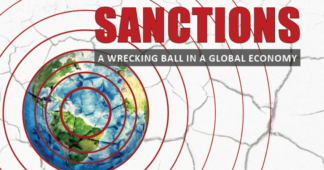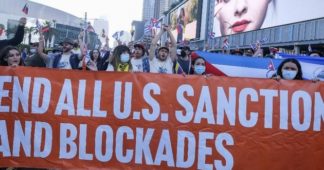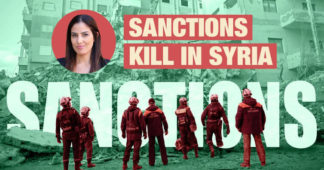By Sue Harris
Aug 7, 2025
Two documents together explain the lethal effect of economic sanctions applied by powerful imperialist countries on about one-third of the world’s population, mostly the poorest and most vulnerable residents of much poorer countries. According to these documents, sanctions were responsible for killing about a half-million people each year for the last 10 years.
One document is a technical paper published in the prestigious and internationally respected medical journal The Lancet. It requires technical knowledge to read with understanding. We link it here: “Effects of international sanctions on age-specific mortality: a cross-national panel data.”
The other document is a commentary by one of the authors of The Lancet paper, Mark Weisbrot, published first by the Center for Economic Policy Research and then in many other newspapers and magazines: “Rethink sanctions. They’re killing as many people as war does.”
Weisbrot’s commentary has been widely published, including by the Los Angeles Times, St. Louis Post-Dispatch, East Bay Times, The San Jose Mercury News, Fort Worth Star-Telegram, and many other media.
What are sanctions?
Sanctions are the negative economic effects created by outside interference with a country’s trade or the refusal to allow that country to trade. Sanctions can block access to essential imports such as medicine and food and the necessary infrastructure and spare parts to maintain drinkable water, including electrical systems. They can also be imposed to block exports, interfering with essential commercial transactions. Historically, such interference in the economic life of a country has been considered an act of war.
What the powerful imperialist countries imposing sanctions are doing is cutting off a country from the international financial system and exports, freezing billions of dollars of assets and imposing “secondary sanctions” on other countries that might do business with that country. These steps make the conditions for the population of the sanctioned country even more dire.
As Weisbrot points out — and this is the most chilling statistic — the populations most often killed by sanctions are children under five years of age, not soldiers.
Sara Flounders, contributing editor of Workers World Newspaper, organizer with the International Action Center (IAC) and co-editor of the book “Sanctions: a Wrecking Ball in a Global Economy” (2022), has called sanctions the most brutal form of war. The IAC has been fighting sanctions since its founding in 1992, while the U.S. working through the United Nations was imposing sanctions on Iraq following the 1991 war.
Flounders said at the time: “Countries lacked basic antibiotics and essential medicines, so that diarrhea or a broken bone was often a death sentence. There was no way to process clean water or pay teachers or medical staff.” (“Sanctions kill: a book, a webinar, a movement”)
Cuba has been heavily sanctioned by the imperialists for 60 years in what has amounted to an economic blockade, yet Cuba has supplied more doctors and medical staff to Africa than the World Health Organization.
Flounders reported that Cuba had developed its own vaccines to counter the COVID-19 pandemic, but because of the sanctions, it took a worldwide movement to send enough syringes for the Cuban medical system to immunize its own population.
The countries imposing economic sanctions are the wealthiest, the most powerful and the most industrially developed countries in the world (with the exception of China, which does not employ sanctions). These countries’ rulers aim to choke the economies of developing countries, most of which were formerly colonized. Sanctions on one country impact the economies of the whole region in which they are located.
Sanctions are the imperialist weapon of choice, a silent weapon that kills the most vulnerable in ways that are not immediately visible, unlike bombs or bullets. In a war, many of those killed are soldiers, although in most wars since the 20th century began there have been more civilian than military casualties. Under sanctions, it is the children and the elderly who are the quickest to die.
Sanctions appear to be less violent than overt war, but the documents referenced here prove definitively that they can be as deadly and violent as bombs and bullets and must be fought by any movements that oppose imperialist war.
We remind our readers that publication of articles on our site does not mean that we agree with what is written. Our policy is to publish anything which we consider of interest, so as to assist our readers in forming their opinions. Sometimes we even publish articles with which we totally disagree, since we believe it is important for our readers to be informed on as wide a spectrum of views as possible.











